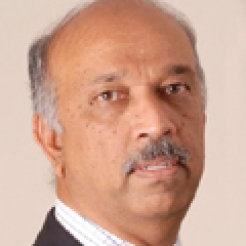Chakrapani Perangur, Chief Information Officer, Indus Towers

“When I was a student, computer science was seen as an evolving subject, a field that would be in demand for the next 20 years. It promised a lot of opportunity to kindle innovations in fields like electronics, telecom, human sciences and medicine,” he says.
During the early years of his career, Perangur worked on low-level computing programmes – working with microprocessor controls, control systems and robotic control software. Subsequently, he gained hands-on knowledge of data bases and programming, and began working with system-level computing platforms.
“The big shift in my career came in 1996 when I moved to telecom,” he recalls. “This sector always fascinated me as it was a good combination of software and telecom protocols. Technologies such as radio frequency and satellite communications interested me and my prior knowledge of hardware and systems also aided my decision to join this industry.”
The shift was timely as the sector was witnessing tremendous growth “The telecom revolution was just beginning in the country,” says Perangur.
Since then, he has worked with several telecom players, including Bharti Airtel, Tata Teleservices Limited, Birla AT&T and Tata Sky. His most memorable assignment was introducing e-bills at Bharti Airtel, which replaced paper bills. “This taught me that small innovations go a long way in managing costs and making the company profitable.”
Currently chief information officer with Indus Towers, he is responsible for the company’s IT services, including tower information processing and its in-house tower management system “TALK”, which supports operators’ network operations centres.
The biggest challenge in this, he feels, is managing different platforms and applications in an “uncontrolled” environment. “Typically, in a monitoring system employed in data centres, the IT team works in a controlled environment. But in the infrastructure industry, one has to deal with the challenge of managing distributive assets in an uncontrolled environment. Different sites have different climatic conditions and hence specific challenges.”
Perangur unwinds by playing golf and reading management books such as Good to Great. He also follows reality shows, his favourite being The Daily Show with Jon Stewart.- Most Viewed
- Most Rated
- Most Shared
- Related Articles
- Sunil Tolani, COO, Madhya Pradesh and Ch...
- Sanjoy Mukerji, Director, Business Opera...
- Raju Vegesna, MD and CEO, Sify Technolog...
- Prateek Pashine, President, SME Operatio...
- Mahendra Nahata, Head, HFCL
- Vivek Chandel, COO, TATA DOCOMO, Uttar P...
- R.K. Upadhyay, CMD, TCIL
- Navin Kaul, COO, Viom Networks Limited
- Abhishek Chauhan, Senior Consultant, ICT...
- Cui Liangjun, CEO, ZTE Telecom India Lim...






